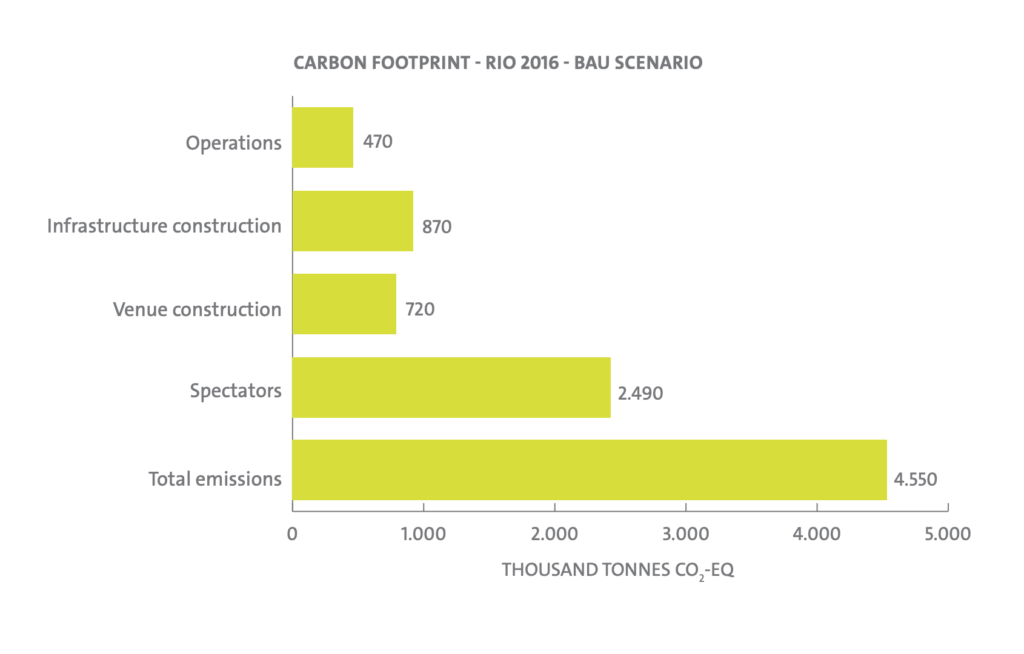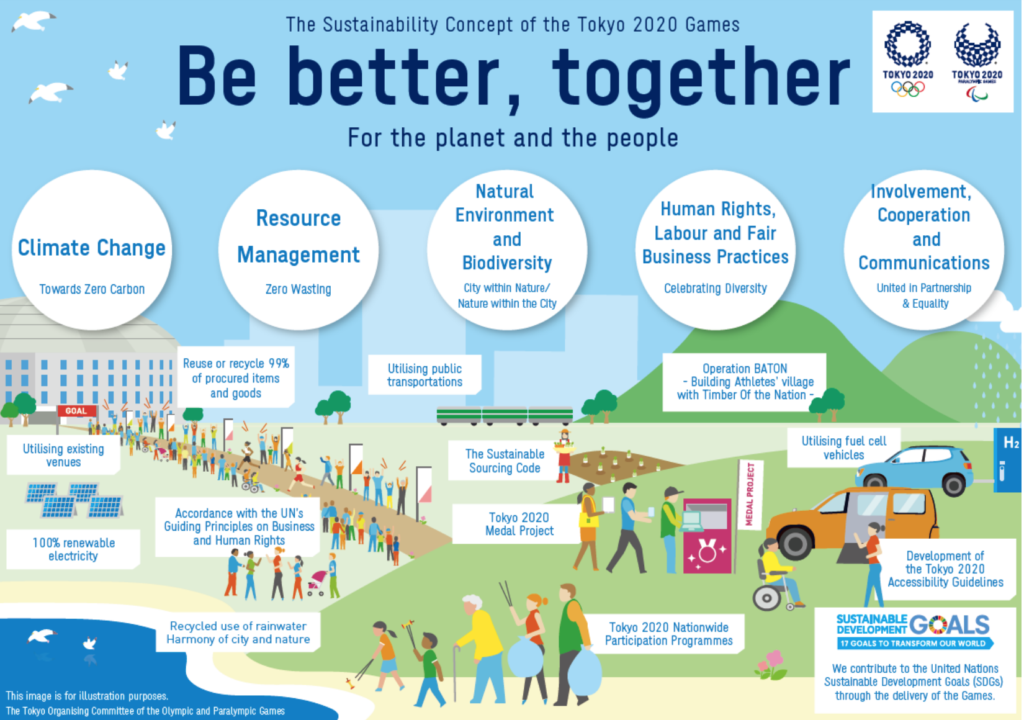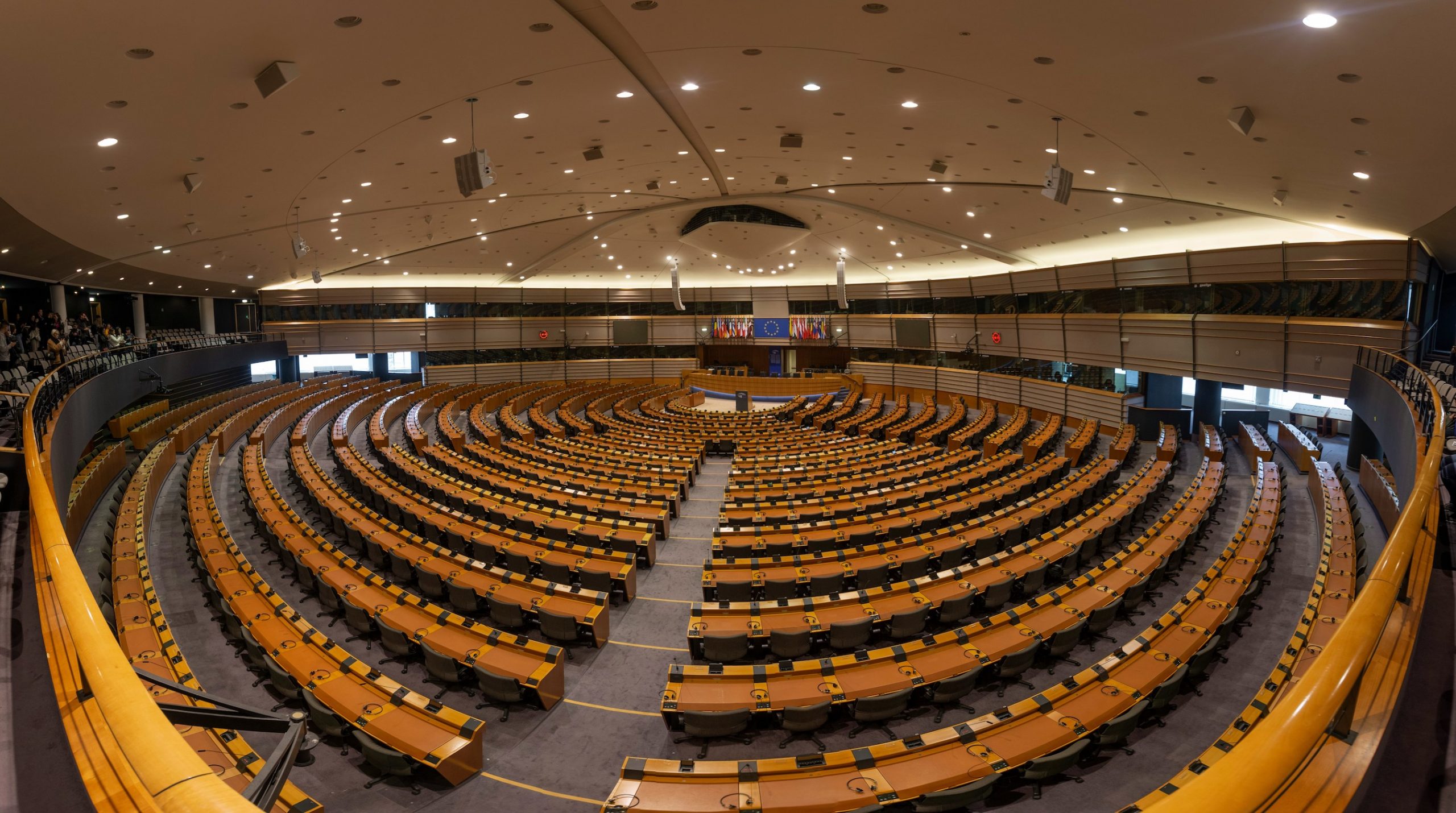Sport is an important enabler of sustainable development as it can contribute to the realization of sustainable development goals not only by limiting its emissions but also by setting the example and acting as a benchmark for other events. UN Climate Change has invited sports organizations and their stakeholders to join the Sports for Climate Action initiative which aims to guide sports actors in achieving global climate change goals.
The main objective is ensuring that sports organizations engage in efforts to become climate neutral and in this way also set the example and incentivise climate action beyond the sports sector. The Sports for Climate Action initiative unites sports organizations and their communities behind the path of the low carbon economy that global leaders agreed on in Paris.
One of the major players in this process is the International Olympic Committee that is contributing to key areas of action within the movement, calling for other governing bodies, sports federations, leagues and clubs, to join and jointly develop the climate action agenda in sports.
Andrew Simms, coordinator of the Rapid Transition Alliance, explains that, “Sport provides some of society’s most influential role models. If sport can change how it operates to act at the speed and scale necessary to halt the climate emergency, others will follow.”
How green are the Olympics
Recent Olympic events have been far from sustainable. In fact, a study published in Nature indicates that of the 16 editions of the Summer and Winter Olympic Games between 1992 and 2020, the overall sustainability has declined over time. Salt Lake City 2002 was the most sustainable Olympic Games in this period, whereas Sochi 2014 and Rio de Janeiro 2016 were the least sustainable.
Although it is hard to calculate the exact carbon footprint of such large events it is believed that the Rio Olympics alone produced around 4.5 million tonnes of CO2.

In response to the widespread criticism of levelled at Rio 2016 due to its high carbon footprint and wasteful practices, organisers of Tokyo 2020 have promised to go carbon neutral, adopting the motto “Be better, together – for the planet and the people”, which enshrines their commitment to the UN Sustainable Development Goals and the Sports for Climate Action initiative.
The Tokyo 2020 sustainability strategy is divided into five subject areas, and three reports will be published outlining the results obtained: two of which were published in the buildup to the games and the final one after the Games have finished.
Organisers have looked at the most impactful practices of past Olympics and developed a strategy to improve on them. Furthermore, through the participation of more than 200 local businesses, carbon credits equivalent to 4.38 million tonnes of CO2 emissions have been collected by Tokyo Metropolitan Government and Saitama Prefecture, far exceeding the originally estimated carbon footprint of 2.73 million tonnes of CO2.
Initiatives such as using electric and hydrogen-powered vehicles for the Olympic fleet and developing a code for suppliers (which also involves, the use of fish products that have been farmed or caught according to FAO guidelines and the use of palm oil that’s been certified by the RSPO) are just a few examples of the measures taken.
“Tokyo 2020 and its delivery partners are committed to building the groundwork for [a] decarbonised society with collective participation, focusing on maximising the transition into energy efficiency and renewable energy use”, reads the Olympic Committee’s report.
Making Tokyo 2020 sustainable
The Olympics are an important chance for Japan to make up for some of its recent shortcomings in the realm of climate ambition. By including references to the goals set out in the Paris Accord, organisers want to reach the objective of zero-carbon emissions for Tokyo 2020. Their main tools will be using renewable energy in the sporting and accommodation venues and offsetting excess emissions in collaboration with local administrations.

Another important aspect is ensuring that waste generated is limited. 99% of objects and materials used for Tokyo 2020 will be reused or recycled. For instance, the Olympic torch is made from aluminium recovered from the structures that housed survivors of the Tōhoku disaster.
Furthermore, Tokyo 2020’s sustainable strategy has placed an emphasis on green spaces through efficient energy and water management and protecting native vegetation by including them in the development plans of the Games’ venues.
Finally, the symbolically important National Stadium uses solar panels attached to the roof. The project’s architect, Kengo Kuma stated that “the solar panels will be attached to the roof and visible to spectators as they are looking to make this environmental technology very visible as part of the design […] We wanted to create something that captures the people’s thoughts on the environment or the Earth at the time“
All these measures are designed to reduce emissions but also to leave a lasting sign on Japanese society, even after the Games have ended.
Setting the tone for future Olympics
Following the Rio Olympics, it was not to be taken for granted that Tokyo 2020 would place such an emphasis on carbon neutrality. However, the repercussions of their stance are already having an impact on the plans of the future Olympics.
For Paris 2024 organizers have already pledged a 55% decrease in the Games’ carbon footprint in comparison with the last two editions of the Summer Games (London 2012 and Rio 2016). The Paris 2024 Games will thus be the first to be aligned with the Paris Agreement.
Furthermore, the newly selected hosts of the 2032 Olympics, Brisbane, are set to be the first climate positive summer Olympics. Brisbane won’t settle for reducing emissions to zero and offsetting those emissions it can’t avoid (carbon neutral), but it has taken its pledge one step further by agreeing to absorb or remove more than is produced and therefore become ‘carbon negative’—a synonym for climate positive.
“This way, the Olympic Games will become climate positive, meaning that the carbon savings they create will exceed the potential negative impacts of their operations,” states the International Olympic Committee.






